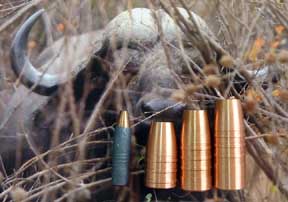

 The Accurate Reloading Forums
The Accurate Reloading Forums  THE ACCURATE RELOADING.COM FORUMS
THE ACCURATE RELOADING.COM FORUMS  Rifles
Rifles  Big Bores
Big Bores  Belt thickness on 375 HH brass
Belt thickness on 375 HH brassGo  | New  | Find  | Notify  | Tools  | Reply  |  |
| one of us |
Hi, I have a nice Parker-Hale vintage rifle that I suspect to be a little long on headspace; I'm ordering a no-go gauge to be sure, but, in the meantime, I've made a puzzling discovery: the RWS brass that I'm using, have a quite "thin" belt; the rim + belt thickness is about .210-.211" while the Federal nickle-plated (I have a few) is about .216-.217". I know that it's a rough measuring, but the difference is real: LEFT, FEDERAL - RIGHT, RWS  .005" can make all the difference between a correct and an excessive headspace, and many of you have probably noticed this problem before; my question is: which brands manufacture the thickest rim + belt 375HH brass? | ||
|
| One of Us |
The headspace gauge is .220". That belted brass is all over the place and not unusual to see it like you are. Jim Kobe 10841 Oxborough Ave So Bloomington MN 55437 952.884.6031 Former Professional member American Custom Gunmakers Guild | |||
|
| One of Us |
You know, I never really noticed. I use Remington mainly, but also Norma and Federal. I get great performance out of the rifle with all three. | |||
|
| One of Us |
Once you determine your headspace is in spec, you can reload and headspace off of the shoulder or at least closer to the shoulder than just using the belt. PA Bear Hunter, NRA Benefactor | |||
|
| One of Us |
When I went to the Colorado School of Trades, I was told by my instructor to NOT use the NO-GO gauge but to use the GO as a NO-GO because of the differences in the various manufactures brass specs. I have never had anyone complain to me that their rifle would not chamber a particular brand of case doing this. Almost any factory built rifle I ever checked showed excessive headspace using the NO-GO gauge. airgun1's recommendation is valid if you do discover excessive headspace but once you've fired a new case in the rifle, the damage has already started. If you neck the new brass up and then partial size until you can just chamber the case, then when you fire it, it will have the proper headspace using the shoulder of the case. From then on, you can only neck size them to maintain proper headspace. The best thing to do is have a smith set the barrel back one turn and re-chamber as I described, although he may not want to do it that way. I think I made a believer out of Tip Burns over this issue. "I ask, sir, what is the Militia? It is the whole people. To disarm the people is the best and most effective way to enslave them" - George Mason, co-author of the Second Amendment during the Virginia convention to ratify the Constitution | |||
|
One of Us |
Good photo. It is obvious that if the bolt closed on athe Federal case, the other would be excessive. "Bitte, trinks du nicht das Wasser. Dahin haben die Kuhen gesheissen." | |||
|
| one of us |
Thanks for your useful hints, I haven't shot this rifle often; anyway, I'm trying the Lee collet dies to minimize the problem. The rifle likely isn't worth any heavy gunsmithing. | |||
|
| One of Us |
You learned a very good lesson not all that many know and understand. I made a gauge out a piece of one inch steel round stock drilled, then bored slightly larger than the case OD just below the belt. A simple measurement with a depth mic will give you the "headspace" of any brand of brass you happen to use....THEY ALL DIFFER. You really don't really need a gauge as you can use ANY piece of brass as a gauge by doing the following: It is easy to adjust your dies or use Redding Comp shell holders to keep from pushing back the shoulder...be sure to headspace on the shoulder...do it by loading a bullet long into the lands to hold the case back against the bolt, then firing a beginning load with a heavy bullet...you should do this with new brass to keep incipient case separation from starting. You only have to do this once. I well over 5 reloads(usually 8-10) from one case doing the above procedure and only about 3...without doing it... before the case starts showing a separation ring It also helps in the accuracy department. A lee collet or FL Bushing type die also makes for longer case life and if the sizing die works the brass too much, polish it out or have the factory/gunsmith do it, depending on how much you reload and shoot a particular caliber and where you place the values. If you only shoot a hundred rounds or so a year, reloading is acutally NOT all that cost effective...the marts have cheap Rem/Win ammo that works very well on all NA game and one or two boxes of something special will last most people a long time...opinions may vary... Congratulations on being very observant. | |||
|
| one of us |
Thanks Foobar, your hint on loading new brass the first time with bullets touching the rifling is GREAT! Unfortunately here (north-west Italy) a box of 375 ammos costs at least $90, so, reloading is mandatory. | |||
|
| One of Us |
I hear that!!!! The trick works with fired brass also, it's just better to start out with new BRASS...not necessarily new AMMO...and if you do use new ammo you can pull the bullet, resize the neck about half way down then reseat the bullet longer and have the same effect. Lots of ways to skin a beaver... In the bad old days of tight money and few components I/we "oldies" did quite a lot of "creative financing" to keep burning powder...we didn't know that was what we were doing, tho', we just called it "tradin'" or "skinnin'" depending on who came out on top. Luck on your projects. | |||
|
| Powered by Social Strata |
| Please Wait. Your request is being processed... |
|
 The Accurate Reloading Forums
The Accurate Reloading Forums  THE ACCURATE RELOADING.COM FORUMS
THE ACCURATE RELOADING.COM FORUMS  Rifles
Rifles  Big Bores
Big Bores  Belt thickness on 375 HH brass
Belt thickness on 375 HH brass

Visit our on-line store for AR Memorabilia

